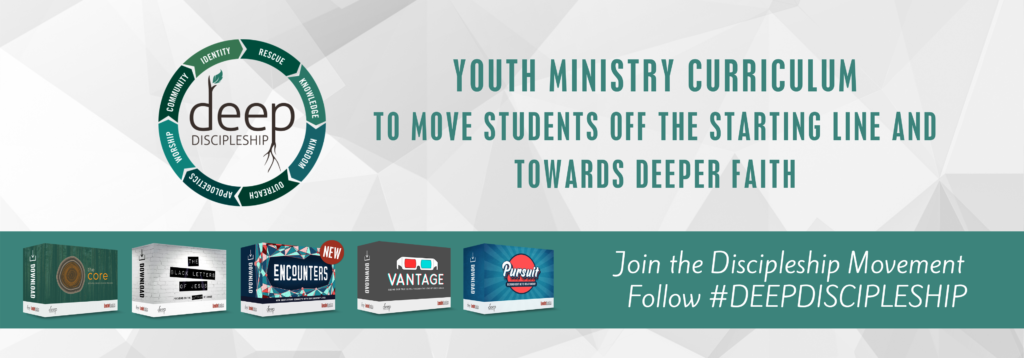Stop Writing Your Own Curriculum
When I first started out in youth ministry, I couldn’t find a curriculum that worked for my youth group. At that time (back when dinosaurs roamed the earth) I didn’t have this little resource called the Internet.
Even when it became a popular in the late 90s, it wasn’t exactly convenient—remember waiting for all of the dial-up beeps, hums, and whirs? In those days, we had to look through a physical catalogue or take a trip to a store to purchase any kind of usable curriculum.
Beyond that, there were three more complications to finding anything in physical form.
FIRST…
I started my youth ministry career in rural New Hampshire, about as far as you could get from the Bible Belt. Our “Christian bookstore” was a small basement someone had converted into a space where we could buy Bibles and cassette tapes of then-unknown bands like Third Day, Audio Adrenaline, Jars of Clay, and DC Talk.
Second…
I felt as if I lived behind a dark shroud of knowledge. No one was mass marketing to one of the most un-churched areas in the country. In the early 90s, no one was aware of companies like Youth Specialties, Group Publishing, or even Lifeway.
third…
Here is the kicker: there was no money in our budget for luxury items like books about games or discussion starters. In my first years of ministry, I was a volunteer youth pastor of four church plants who sent all of their students to me, but I was working with limited financial resources.
My first curriculum experience
It wasn’t until 1997 that I finally had the opportunity to try out a professional curriculum—four boxes of resources given to me as a free gift from some very generous youth workers at a conference. It was like Christmas.
Yet, using this curriculum still proved a challenge. I worked with all un-churched or de-churched kids, and most of the resource was written for students who grew up in the church and knew the basic tenants of the faith.
Everything was in print back then (no digital copies) so to manipulate curriculum meant taking out a pen and “Wite-Out”, and literally rewriting it. It was cumbersome and time consuming. Keep in mind that the idea of small groups being central to youth group was still relatively new.
Youth workers were starting to catch on, but that wasn’t how most curriculums were written. They were built around a creative game, an awesome talk, and finally—if there was any time left to kill—a little time for a discussion.
I felt like I was the only youth worker in the country who built my lessons around small groups.
How about writing my own curriculum?
For all of these reasons, I took the plunge and started writing my own curriculum. But that introduced all new struggles. It was easier to look at an idea in a book and see it as catalytic than it was to manipulate it into my own lessons. And I didn’t realize that I was starting to become proud about my curriculum-writing abilities. I was the best lesson writer of anyone, anywhere, and no one could tell me differently.
Then one day my volunteers told me it wasn’t so good. That was hard to hear. Looking back, I now understand it wasn’t because I wasn’t capable of writing great stuff. I was just too busy to do it well.

Writing a solid, easy-to-use Bible study that a volunteer of any experience level can use takes a huge amount of work and time. I wanted to spend my time building relationships with students, teaching my leaders to disciple teens, and figuring out how to reach this generation for Christ. I didn’t want to spend hours crafting small group curriculum. So I didn’t, and it showed.
A new landscape
This forced me, once again, to go looking for something that could work in my context. By this time, I could download sheets and change a few words or ideas and hand my team something that bordered on amazing. Some organizations had even started making video curriculum, so on the days I didn’t feel particularly wise, someone else was. And here’s the icing on the cake: the Internet was more accessible, so I could find websites full of ideas, games, and discussion starters.
In just the last 10 years, the landscape has changed once again for Bible study curriculum.
- I don’t have to buy a book if I don’t want to, and if I want a video illustration, I can check out YouTube.
- I can pick and choose what I like from a multitude of different companies, large and small.
- I can find lessons and ideas from at least nine places I can think of off the top of my head.
Here is the irony: I keep meeting youth pastors who insist on writing their own curriculum. Some youth workers have the energy and time to do this, but nine times out of ten, they don’t actually enjoy it.

Instead I hear, “There is nothing out there, so I have to write my own.” My other favorite line is, “These companies use professional writers who never actually interact with students.” That’s just not true.
I know many of these people personally. While they may not all lead youth ministries anymore, each stays connected to the student world in huge ways. They lead small groups, talk to parents, and have youth pastors in their offices multiple times a week. More importantly, many of them employ in-the-trenches youth workers as their writers.
“Wouldn’t you rather invest your time into the lives of students instead of sitting in front of a computer?”
There was a time when the boxed set didn’t work. And not every curriculum has everything you need. But the amount of depth and variety out there is astounding compared to when I first started.
The youth ministry curriculum landscape has changed completely. It might be helpful to find other youth pastors in a similar context and ask them what they like. You will probably need to rewrite something here or there. Most curriculum providers actually expect that and provide digital resources to make it easier.
So STOP. Ask yourself, Why am I writing my own curriculum?
If your answer is anything less than, I feel called and passionate about it! then STOP living like you are stuck in rural New Hampshire in 1994. Wouldn’t you rather invest your limited time into the lives of students instead of sitting in front of a computer?

Looking for a fully downloadable set of curriculum that fits into your current ministry structure; allows you to edit lessons; and was written by people who know, love, and serve in student ministry? Check out Deep Discipleship.
About the Author
Leneita Fix
Leneita Fix co-founded Frontline Urban Resources with Jeffrey Wallace to equip, coach, and speak into the lives of those working with families living in a “survival mode” mentality. They refer to this thinking as the “new urban.” Combined, they carry almost four decades of experience in the family ministry setting, most of it in traditional urban ministry. However each… Read More




